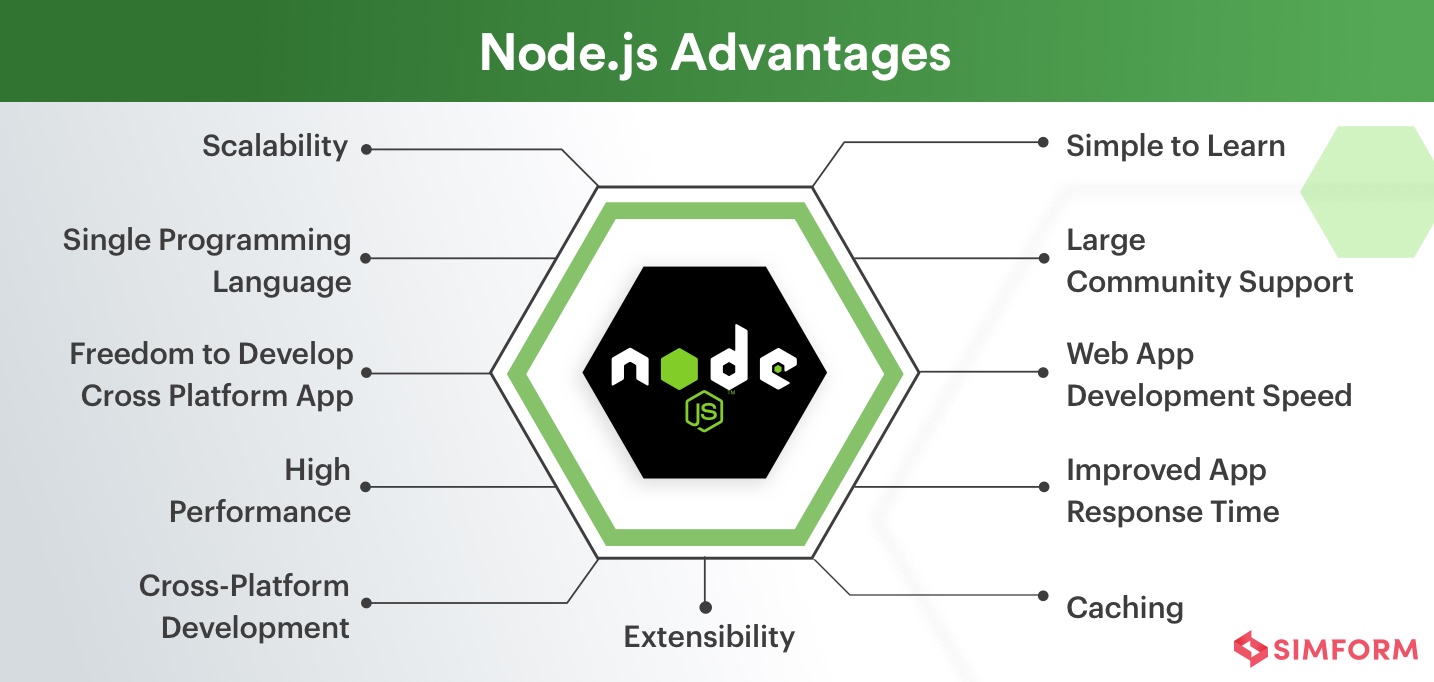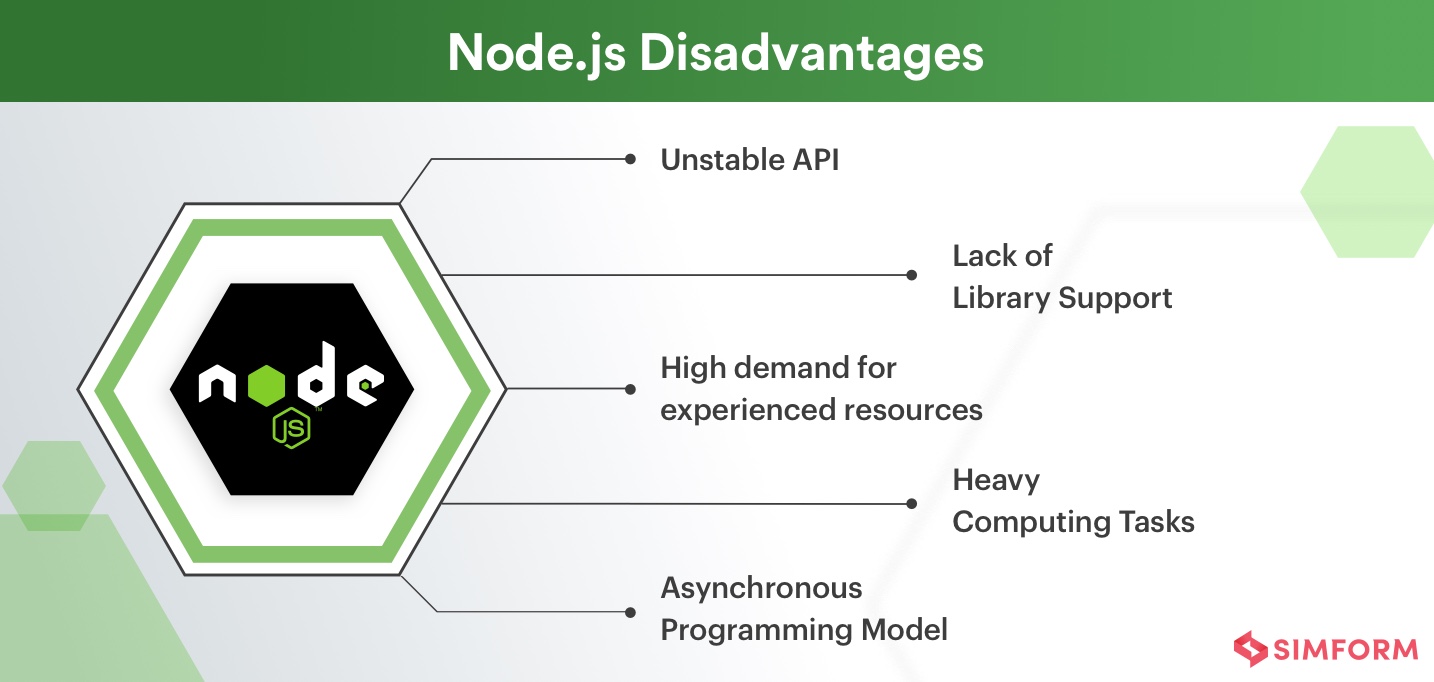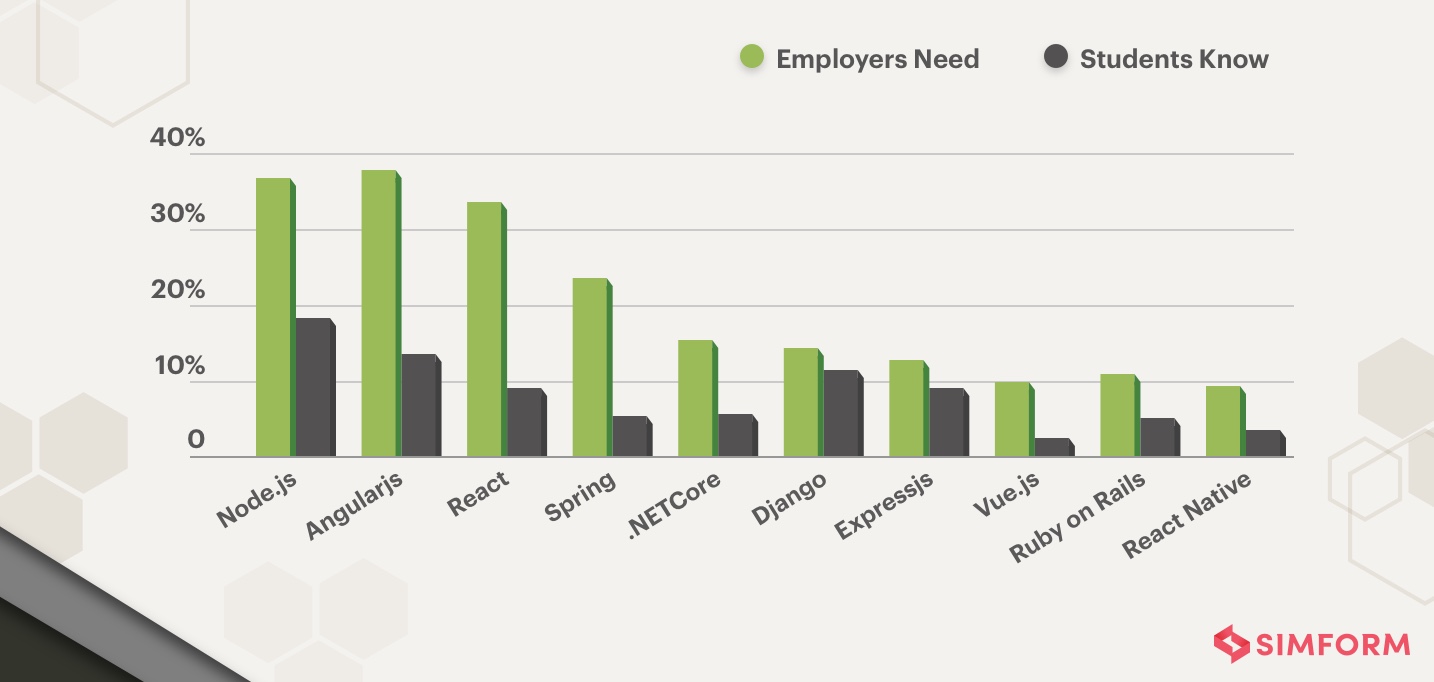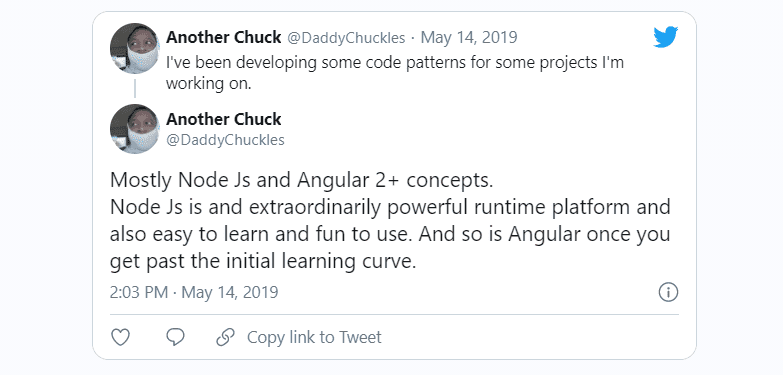When it comes to understanding node.js advantages & disadvantages for your web app, there are multiple factors a CTO or a tech expert has to consider. For instance, tech scalability, speed, performance, application limitations, and much more. Decisions made at this stage determines how fast your application will reach the market.
JavaScript has ruled the web as the most popular client-side programming language. Things that we can do with JavaScript on the server-side was only a concept until the introduction of Node.js in 2009. With node.js advantages, web app development has become extremely simple, cost-effective, and super efficient with JavaScript running on the server-side.
Editor’s note: In case you’re confident about implementing Node.js and want to put your plan to work, consider discussing with our web experts. Being an experienced web app development service provider, we can help you build your custom web app based on your requirements.
Node.js® is an open-source JavaScript runtime environment built on Chrome’s V8 engine. It is event-driven with non-blocking I/O, making it lightweight, efficient, and extremely fast for developing web apps.
Node.js has become the go-to choice for many industries like IT, Healthcare, and many more. It’s hard to resist the simplicity Node.js offers. However, there are some pros and cons to every tech. Hence, let’s explore node.js advantages and disadvantages, so that you can match your needs and make a balanced choice.
Node.js Advantages: Why use Node.js for developing web apps

The impact of a sluggish and unresponsive application can bring a business down to bits and pieces. Node.js, however, has been a knight in shining armor, saving web and mobile apps with its powerful and flexible personality.
In fact, the Node.js 2018 User Survey reported that over 85% of respondents used the Javascript runtime for their web applications. What’s more, it also suggested that the average usage consistency of Node.js extended to more than two years, giving it an edge over its peers.
So what are these node.js advantages that’s been seducing enterprises over the years? Let’s find out!
Offers High-performance for Real-time Applications
One of the benefits of node.js is that you can build supercharged applications that display results in the blink of an eye.
Web applications powered by Node.js benefit massively from its ability to multitask. Unlike other platforms, its single-threaded, event-driven architecture processes multiple concurrent requests efficiently without clogging the RAM. Moreover, its event-loop and non-blocking I/O operations allow code execution at a pace which significantly impacts the application’s overall performance.
Node.js helped GoDaddy outperform its competition. While driving the SuperBowl ad campaign, the web hosting company was able to handle 10,000 requests per second with absolutely no downtime, utilizing only 10% hardware, all thanks to node.js performance.
What fuels Node.js with this superpower is that it’s built on Google Chrome’s V8 engine and written in C++. It breaks Javascript functions into machine codes with high efficiency and speed. Why this matters is because Google invests heavily in its engine to improve performance, security, and provide excellent support for modern JavaScript features. This directly impacts V8’s performance and eventually, Node.js.
To ensure continuous advancements, Google has introduced the V8 benchmark suite to elevate node.js performance with faster execution, better compilers, security patchworks, and the ability to scale.
Offers Easy Scalability for Modern Applications
With a consistently growing consumer base of tens of millions of users, titans like Netflix, Walmart, Uber, Paypal, among others, have regarded Node.js as a viable solution for scalability.
The cutting-edge technology comes with tons of features like the cluster module. It facilitates load balancing over multiple CPU cores, making it easy to deliver desired outcomes through smaller modules without burning out the RAM process. Additionally, Node.js employs a non-blocking event-loop mechanism that offers high scalability and enables the server to process requests seamlessly.
From the development standpoint, Node.js allows you to leverage Microservices that further lets you segregate your application into smaller parts. This way, you get to define tasks and allocate them efficiently among different teams to fast-track development, deployment, and maintenance of each division of your application. Node.js and Microservic allow modern applications to scale up and down as per need and help companies achieve high performance with fewer resources.
Walmart, for one, benefited enormously by replacing its former legacy system with the deadly combination– microservices architecture and Node.js. The retail giant saw an instant growth of 20% in overall conversions, along with a 98% boost in mobile conversion. What’s more, not only did they end up saving 40% of the computing power, but they also cut costs by a whopping 20-50%.
It is Cost-effective with Fullstack JS
Since Node.js gives developers the opportunity to write server-side code in Javascript, we get to write codes on both the frontend and backend with absolute ease. This is one of the biggest node.js advantages as it crosses the barriers of hiring two resource teams besides saving a great deal of time, cost, and energy for overall project development.
Post its migration from Ruby on Rails to Node.js, LinkedIn’s development team gained performance momentum from node.js advantages. They cut down from 30 servers to 3. They also found resource delegation and utilization more efficient, for they were now able to shift their focus from troubleshooting to application development.
Offers Community Support to Simplify Development
With millions of developers contributing actively to the Node.js community, you can expect extensive support from development experts across the globe to solve even the most peculiar development problems.
NPM, a package manager for JavaScript, is the biggest package manager registry in the world. It offers numerous tools and libraries available readily for you to use in your project. You’ll also find a large pool of resources – ready-to-use solutions, codes, modules, libraries, and registries – on GitHub built by developers to help you achieve more with limited resources.
This ever-evolving technology is being deeply supported by IBM, who has expressed its plans to sponsor and speak at key Node events to drive and mature in the project. In addition to this, they also wish to push for open governance in the merger of Node.js and JS Foundations, which they think will result in a stronger, more vibrant JavaScript ecosystem.
This vibrant community is backed up by many leading tech giants such as Amazon, Google, Facebook, and Netflix, contributing to node.js advantages massively. They have made notable contributions in the form of many open source solutions. Acceptance by tech giants, alongside the developer’s community, ensures tech presence and growth in the foreseeable future.
It is Easy to Learn and Quick to Adapt
It is undisputed that javascript is one of the most popular and widely used programming languages in the developer’s community. It is a lot easier to adapt and learn Node.js for web application development and other popular Node.js use cases. It takes less time to write codes.
According to Node.js 2016 User Survey, Javascript is one of the most well-liked programming languages for front-end development. It’s almost like it is a universal programming language. It requires less time and effort to learn and work with Node.js, even if it is just a beginner or a junior developer.
As per a recent StackOverflow survey, an amazing 49,9% of the professional developers, which participated in the voting, elected Node.js as the most commonly used technology. Which also answers the question of why node.js is so popular.
Helps in building Cross-functional Teams
Let’s say you’ve employed two different teams for project development and quality testing, who work independently and whose responsibilities are confined to their expertise. Although this could sound ideal, chances are these teams have massive communication gaps, resulting in a mammoth of loopholes in your product.
Sounds like a problem, yeah? Node.js is the solution!

Since Node.js offers full-stack development capability, it helps you in building a team that focuses on enhancing your development life cycle wherein you get to address challenges instantaneously. This work environment adds value to healthier productivity and lets you resolve issues and troubleshoot them duly. As a result, you are more likely to shorten your time-to-market.
Improves App Response Time and Boosts Performance
Did you know when Netflix switched from Java and Javascript to Node.js they hit the jackpot by dramatically reducing their start-up time from 40 minutes to under 60 seconds?
BAM! That’s something, ain’t it?
Well, it’s a given that a constant too and fro of requests has a significant impact on an app’s response time and performance, mostly a negative one if your tech stack is not equipped to handle the load of requests.
Here where Node.js, with its single-threaded event-loop model, offers a non-blocking asynchronous architecture without creating more threads by employing fewer resources. This helps boost the responsiveness of your application since it can deal with multiple concurrent users simultaneously.
Reduces Time-to-Market of your Applications
Time is priceless to any development team, especially when time-to-market is one of the essential benchmarks of quality and performance for many. Since Node.js is lightweight, it enables developers to accelerate the overall development speed. What’s more, your team gets to use a ton of libraries, ready-to-use codes, and other resources from GitHub, which, in turn, saves a lot of coding time and effort.
Node.js also offers client-side and server-side in Javascript, making it easier and faster to manage code and data files than other similar technologies. In addition to this, its deployments assist you in receiving feedback from the production environment to execution, which also contributes to shortening your application’s time-to-market.
Offers Extensibility to Meet Customized Requirements
Businesses never cease to evolve. So whether you’ve had a spike in your user base or you’re planning to explore other industry dimensions, Node.js can be easily extended and customized for rapidly growing enterprises. Node.js can be extended by leveraging built-in API for developing HTTP and DNS servers and JSON, a data format, which makes data exchange between client and web servers extremely easy.
PayPal, for one, had a phenomenal 2013 with a yearly payment volume of $451 billion and over 244 million active users globally. It was then when the payment titan replaced Java with JavaScript and Node.js. The astonishing outcome to this was a 200ms faster page response time and multiplied the number of requests they were empowered to handle per second.
Reduces Loading Time by Quick Caching
Node.js has made it easy for developers to reduce task workload and re-execution of code with its caching module. So every time the first module of your web application gets a request, it gets cached in the in-app memory. This way, within a fraction of microseconds, your users get to quickly access the web pages without having to wait for too long.
As a matter of fact, eBay was quick to leverage node.js advantages by adding it to their tech stack, for they wanted their application to be super-efficient and as real-time as possible to manage live connections with the server. Node.js proved to be the perfect resolution that helped them cater to an enormous number of data to display in microseconds.
Check how we build SentMap - a real-time sentiment-based market analytics tool using Node.js
Helps in Building Cross-Platform Applications
With Node.js, you can leverage platforms like Electron and NW.js to build cross-platform real-time web applications. This means you no longer need to invest time behind writing separate codes for various desktop versions – Windows, Linux, and macOS.
Going forward, your development team can build native desktop applications without expert-level knowledge in Objective-C, C#, or any other languages. Additionally, your Node.js developers can access more tools from Google Chrome Developer Tools to build, debug, and write codes without any limitations.
This highly effective approach plays a vital role in web development around Javascript frameworks like AnjularJS, Vue.js, and React for frontend and Node.js for the backend. It has given full-stack developers an opportunity to benefit from node.js advantages and possibilities it offers.
Node.js Disadvantages: what is node.js not good for

85% of the companies using node.js are using it for developing web apps. There are many benefits of node.js, however, like every echnology node.js has some disadvantages too.
Reduces performance when handling Heavy Computing Tasks
Despite its advantages of being single-threaded and event-driven, Node.js falls short at executing heavy CPU-based computing for the exact same reason.
When Node.js receives a sizable CPU-driven task in its event loop, it utilizes all of its available CPU strength to accomplish the undertaking. This leads to the deceleration of the overall event loop, further hindering your application’s interface.
To solve this, in 2018, Node.js introduced the “worker threads” module that allowed developers to execute multiple threads simultaneously. However, this solution does not entirely equip you to deal with CPU-bound computation challenges.
Heavy code changes due to Unstable API
One of the most significant drawbacks reported by Node.js users is the frequent API changes, which are generally backward-incompatible, that drive them up the wall. Unfortunately, this forces them to continually change the access code to match in sync with the latest version of Node.js API.
Node.js Asynchronous Programming Model makes it difficult to maintain code
The technology overall replies a lot on callbacks due to its core nature of the asynchronous approach. This function operates just after every task in queue safekeeping several queued tasks in the background are still running. The callback might result in also known as callback hell. This directly impacts the performance and the quality of the code itself. This limitation practically makes it tedious to understand and maintain the code.
Lack of Library Support can Endanger your Code
There are several NPM registries and libraries which are either poor quality or incomplete and not appropriately documented. Hence this inadequate monitoring is difficult if some amateurs develop a web application in Node.js.
Only the well qualified and experts with reputable experts with project experience can drive success to your project. The fact that it is open-source with such a pool of libraries and modules might create a lack of high coding standards. It is vital to pick the right tech partner to build your web applications for extraordinary outcomes.
High demand with a few Experienced Node.js Developers
Based on surveys conducted of over 10,000 student developers, hackerrank has identified the biggest student talent trends shaping university recruiting each year. Students tune into the talent pool every year and enroll in the trending demands of the industry to stay ahead in this competitive market. The tech giants are as well notoriously competitive to grab the right talents—leading enterprises such as Amazon, Facebook, and LinkedIn each year at the career fair. Unfortunately, the demand is growing exponentially faster than expected, and there aren’t many experienced node.js developers to match market needs.

According to A recent study, the biggest increase in demand for Node.js alone was 2493%.
There is a widespread wrong belief that javascript developers are technically Node.js developers too. One has to be well-versed with javascript back-end to be able to learn node.js. Even though there is a constant rise in demand, finding an experienced node.js developer is challenging.
Conclusion
Node.js plays a stellar role in developing scalable & high performing web applications. Our developers love exploiting node.js advantages and so do the companies working with us. It offers a perfect package of performance, scale, and speed, which powers use cases important for web apps in 2020. As long as your application doesn’t require CPU intensive tasks, your applications can leverage node.js advantages I have shared in this blog.
If you are still uncertain about the benefits of Node.js and whether it will be helpful in your project, then feel free to contact me on tejas@simform.com. I’d love to offer you a free consultation and help you understand if Node.js will prove beneficial for you or not.
FAQ’s
Is Node.js good for the backend?
Yes! Node.js scales better works fabulously with real-time tasks and is super fast overall.
Why is Node.js so popular?
The asynchronous programming in Node.js makes it a viable and efficient choice. Its event-driven architecture enables it to handle multiple concurrent requests simultaneously while keeping it lightweight.
Why is Node.js so fast?
The main reason Node.js is so fast is due to its non-blocking I/O model. NodeJS uses a single asynchronous thread, which reduces the CPU workload and avoids HTTP congestion.
What are the Pros of Node.js?
Node.js offers numerous benefits for web app development such as high scalability, ease of learning, extraordinary performance, profound extensiveness, active support from a large community of developers, among others.
What are the Cons of Node.js?
Node.js has some cons like unstable Application Programming Interface (API), lack of a robust library support system, and lack of experienced Node.js developers in the market.
What are the Benefits of Node.js Performance?
Chrome’s V8 engine, the fastest javascript engine, significantly improves Node.js performance. Node.js is single-threaded. asynchronous, and works on a non-blocking I/O model. This boosts performance by handling multiple concurrent threads simultaneously with fewer resources.



